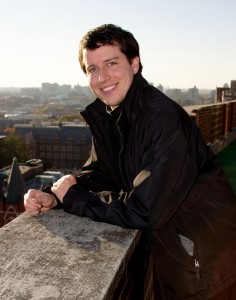 “A geek” is how Michael Rozier, S.J., was described in February 2002 as The University News editorialized about Rozier’s election as Student Government Association president.
“A geek” is how Michael Rozier, S.J., was described in February 2002 as The University News editorialized about Rozier’s election as Student Government Association president.
That was then.
Now, Rozier—currently the program director of the Undergraduate Community Health program—can be described as a visionary, a servant, a man of God and even as a self-proclaimed political junkie.
Rozier graduated from Saint Louis University in the spring of 2003, and instead of continuing on to medical school as he had planned since his freshman year, he entered the priesthood.
“There was always something inside kind of churning in me, this question of whether I would be called to going into the priesthood,” Rozier said.
Though Rozier’s inklings of being called have been with him throughout the majority of his undergraduate career, it was not until his junior year that he acquired a spiritual director and looked into becoming a Jesuit. He made the decision to defer his acceptance into medical school for two years to explore the Jesuits in further detail.
“There was no visit from an angel or lightning bolt, as much as we would like that for those bigger decisions in life,” Rozier said. “It was more of a gradual process. To be honest I felt that I was being led up closer and closer to the edge of the cliff. I had to decide, ‘Am I willing to jump or not?’”
Rozier decided to take the plunge and is incredibly satisfied with his choice. “[I] absolutely fell in love with the life,” said Rozier.
Rozier expressed that his decision to give up his life to Society of Jesus was solidified with his experiences working at a federal prison in Belize during his first two years in the order.
After professing his vows, Rozier had to make another decision: whether or not to practice medicine.
“The way my head was working, I was more interested with the social structures associated with health and decided to get my degree in public health,” Rozier said.
Public health, according to Rozier, is an under-recognized discipline.
“If you look at the major changes that have gone on in terms of people becoming healthier—it’s sanitation, water, vaccinations and food security,” Rozier said. “Those things, the things that have most improved people’s health, are public health.”
While Rozier will be leaving the University at the end of this academic year, he will attempt to incorporate his passion for public health into his theological studies.
“Theology will be my primary focus, but guys who are interested in other fields find a way to blend that field with theology,” said Rozier. “I don’t plan on stepping away from public health entirely. I don’t think I could.”
While those who have Rozier in class see that his fervor for public health is evident, an interest of Rozier’s that is not as obvious is his love for socializing.
“My favorite thing is going out and having dinner with my friends,” Rozier said. “I don’t think there’s anything better than a good conversation and having that over a good meal, that’s it for me.”
Rozier is also a musician, having played in the Johns Hopkins’ Medical Institute Orchestra which is composed of students studying in the various health science programs at the university.
“I played in the orchestra and a woodwind quintet, and the clarinet [player] for the quintet was the head of the American Diabetes Association,” said Rozier as he expressed how interesting it was for him to play among such similarly minded individuals.
Though Rozier has had many experiences outside the SLU realm, he greatly enjoys being a member of the SLU community.
“It’s one of those places that you can give yourself over to, and it gives everything right back,” Rozier said, as he spoke of his time as a student as a current faculty member.
“We have incredible students here; not only really bright, but good, good people,” Rozier said. “I love being a faculty member for that reason.”
Rozier leaves the SLU community with one piece of advice. “Find something, or things, that you deeply love and give yourself over to it,” Rozier said.
That “thing” for Rozier: “It’s loving people like we see people being loved in the Gospel.”









